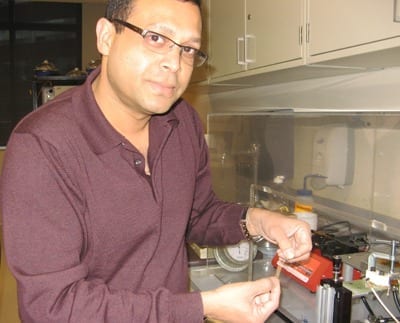
HSCI researchers discover hormone that spurs beta cell production
Researchers at the Harvard Stem Cell Institute (HSCI) have discovered a hormone that holds promise for a dramatically more effective treatment of type 2 diabetes, a metabolic illness afflicting an estimated 26 million Americans. The researchers believe that the hormone might also have a role in treating type 1, or juvenile, diabetes.
Click here to watch a video about this breakthrough.
The work was published today by the journal Cell as an early on-line release. It is scheduled for the May 9 print edition of the journal.
The hormone, called betatrophin, causes mice to produce insulin-secreting pancreatic beta cells at up to 30 times the normal rate. The new beta cells only produce insulin when called for by the body, offering the potential for the natural regulation of insulin and a great reduction in the complications associated with diabetes, the leading medical cause of amputations and non-genetic loss of vision.
The researchers who discovered betatrophin, HSCI Co-Director Doug Melton and postdoctoral fellow Peng Yi, caution that much work remains to be done before it could be used as a treatment in humans. But the results of their work, which was supported in large part by a federal research grant, already have attracted the attention of drug manufacturers.
“If this could be used in people,” said Melton, Harvard’s Xander University Professor and co-chair of the University’s Department of Stem Cell and Regenerative Biology, “it could eventually mean that instead of taking insulin injections three times a day, you might take an injection of this hormone once a week or once a month, or in the best case maybe even once a year.”
Type 2 diabetes, a disease associated with the national obesity epidemic, is usually caused by a combination of excess weight and lack of exercise. It causes patients to slowly lose beta cells and the ability to produce adequate insulin. One recent study has estimated that diabetes treatment and complications cost the United States $218 billion annually, or about 10 percent of the nation’s entire health bill.
“Our idea here is relatively simple,” Melton said. “We would provide this hormone, the type 2 diabetic will make more of their own insulin-producing cells, and this will slow down, if not stop, the progression of their diabetes. I’ve never seen any treatment that causes such an enormous leap in beta cell replication.”
Though Melton sees betatrophin primarily as a treatment for type 2 diabetes, he believes it might play a role in the treatment of type 1 diabetes as well, perhaps boosting the number of beta cells and slowing the progression of that autoimmune disease when it’s first diagnosed.
“We’ve done the work in mice,” Melton said, “but of course we’re not interested in curing mice of diabetes, and we now know the gene is a human gene. We’ve cloned the human gene and, moreover, we know that the hormone exists in human plasma; betatrophin definitely exists in humans.”
While Melton was clear about the need for more research before the hormone could be available as a drug, he also said that betatrophin could be in human clinical trials within three to five years, an extremely short time in the normal course of drug discovery and development.
The Latest Bing News on:
Type 2 diabetes
- Diabetes Management Program Cuts Dementia Risk in Patients With Type 2 Diabeteson April 26, 2024 at 5:44 am
Researchers explored the association between receiving a multidisciplinary primary care diabetes management program and the subsequent risk for dementia among patients with type 2 diabetes.
- This Type 2 Diabetes Food List Makes Grocery Shopping So Much Easieron April 26, 2024 at 4:00 am
Getting a type 2 diabetes diagnosis can feel overwhelming, and it may seem difficult to nail down the best healthy foods to properly fuel your body and keep your blood sugar stable. But fear ...
- Food additive emulsifiers linked to increased risk of type 2 diabeteson April 25, 2024 at 10:19 pm
Study found a link between consuming certain food emulsifiers and a higher risk of type 2 diabetes. Emulsifiers are common in processed foods and may disrupt gut health, potentially leading to ...
- Lung problems ‘should now be seen as complication of type 2 diabetes’on April 25, 2024 at 5:30 pm
Lung problems should now be seen as a potential complication of type 2 diabetes, a charity has warned. Diabetes UK said new research shows lung disorders can be a direct complication of the condition, ...
- Intensive blood pressure treatment may help some middle-aged women with type 2 diabetes, early-onset hypertensionon April 25, 2024 at 10:30 am
Investigators in the Smidt Heart Institute at Cedars-Sinai and colleagues report that women with type 2 diabetes diagnosed with hypertension before age 50 may benefit from intensive blood pressure ...
- Genetics predict type 2 diabetes risk and disparities in childhood cancer survivorson April 24, 2024 at 11:50 am
Survivors of childhood cancer are at increased risk for cardiovascular disease, for which a risk factor is their greater prevalence of type 2 diabetes, with a disproportionate impact on those of ...
- Emulsifiers in processed foods may be linked to increased risk of type 2 diabeteson April 24, 2024 at 9:51 am
For the first time worldwide, a team of researchers in France has studied the relationships between the dietary intakes of emulsifiers, assessed over a follow-up period of maximum 14 years, and the ...
- Does Alcohol Increase Your Risk of Type 2 Diabetes?on April 24, 2024 at 8:45 am
Alcohol gets a bad rap for a lot of reasons, but does it really raise your risk of diabetes? Nearly 1 in every 10 Americans develops diabetes, most of which is type 2 diabetes. Risk factors for type 2 ...
- Updates in Managing Elderly Patients With Type 2 Diabeteson April 23, 2024 at 5:00 pm
Lyse Bordier, MD, an endocrinologist and metabolic diseases specialist at Bégin Military Teaching Hospital in Saint-Mandé, France, discussed these topics at the Francophone Diabetes Society Congress.
- New guidelines recommend GLP-1 drugs such as Ozempic to help treat type 2 diabetes in adultson April 18, 2024 at 11:27 pm
The American College of Physicians has released new guidelines in which they recommend using weight loss drugs such as Ozempic to help some people manage type 2 diabetes ...
The Latest Google Headlines on:
Type 2 diabetes
[google_news title=”” keyword=”type 2 diabetes” num_posts=”10″ blurb_length=”0″ show_thumb=”left”] [/vc_column_text]The Latest Bing News on:
Diabetes treatment
- Affordability of Lirafit expected to significantly impact Indian diabetes market: Alok Malikon April 28, 2024 at 6:33 am
Liraglutide is a glucagon-like peptide-1 receptor agonist (GLP-1 RA) that has been shown to effectively lower glycemic parameters, promote weight reduction, and ensure cardiovascular safety in ...
- Semaglutide v. tirzepatide: What to know about popular weight loss and diabetes drugs like Ozempicon April 27, 2024 at 4:00 am
Over the past few years, medications like Ozempic and Mounjaro have revolutionized the treatment of Type 2 diabetes and obesity — and they’ve soared in popularity as a result. Studies have shown the ...
- Remove barriers to getting diabetes technologieson April 26, 2024 at 12:53 pm
Twenty-five years into the use and development of diabetes maintenance with CGMs, proven to decrease overall costs and increase standard of living, it is time for these barriers to be removed.
- Diabetes: Know Symptoms, Causes, Types And Treatmenton April 26, 2024 at 3:17 am
“Common symptoms of diabetes include feeling very thirsty, urinating a lot, being more tired than usual, losing weight without trying, and having blurry vision. If you notice these signs, see a doctor ...
- Diabetes drug shows promise for the treatment of acute heart failureon April 25, 2024 at 2:04 pm
A multicenter study led by Vanderbilt University Medical Center (VUMC) and Lipscomb University College of Pharmacy in Nashville has identified a potential new treatment for acute heart failure, a ...
- Inhaled insulin could improve lives of patients with diabeteson April 25, 2024 at 10:02 am
Millions of people around the world live with diabetes mellitus. Many of them have medication and specific dietary management approaches to help them maintain stable blood sugar levels. However, ...
- Treatment of osteoporosis with Denosumab associated with lower risk of incident diabetes especially among elderly: JAMAon April 25, 2024 at 8:45 am
Denosumab treatment is associated with a lower risk of incident diabetes especially among elderly patients with osteoporosis, suggests a new study published in the JAMA Network Open.Denosumab, ...
- Advanced insulin pumps enhance blood sugar management in type 1 diabeteson April 24, 2024 at 9:48 pm
Blood sugar levels improve when adults with type 1 diabetes use modern insulin pumps. These are the findings of a study conducted at the University of Gothenburg.
- Dr Beau Raymond: How Ochsner’s Digital Program Promotes Tailored Diabetes Managementon April 24, 2024 at 6:16 am
Diabetes treatment goals vary based on age and diabetes type, with more focus on managing insulin levels for children and adolescents while addressing comorbid conditions like obesity and hypertension ...
- Siblings with unique gene mutation offer insights into type 1 diabetes treatmenton April 20, 2024 at 10:51 pm
Two siblings who have the only known mutations in a key gene anywhere in the world have helped scientists gain new insights that could help progress the search for new treatments in type 1 diabetes.
The Latest Google Headlines on:
Diabetes treatment
[google_news title=”” keyword=”diabetes treatment” num_posts=”10″ blurb_length=”0″ show_thumb=”left”]











